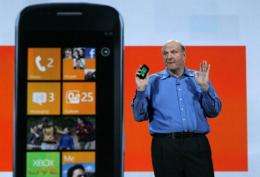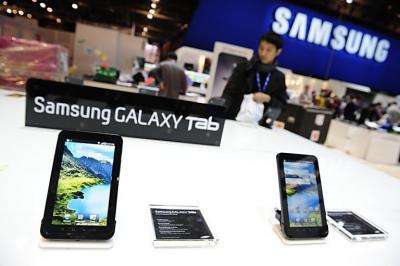Microsoft CEO Steve Ballmer delivers a keynote address on January 5 at the 2011 International Consumer Electronics Show in Las Vegas, Nevada. The show gives center stage to smarter devices, homes and cars for the always connected lifestyle.
Smarter devices, homes and cars for the always connected lifestyle are taking center stage as the annual Consumer Electronics Show kicks off here on Thursday.
Slick new smartphones, ultra-thin laptops, tablet computers to rival Apple's iPad and Web-connected and 3D television sets are expected to grab the most attention during the four-day event at the Las Vegas Convention Center.
But the show floor will also feature more smart home appliances such as ovens which can download recipes and vehicles which give drivers hands-free voice control access to their smartphone applications.
Technology titans such as Cisco, Intel, LG Electronics, Microsoft, Motorola, Panasonic, Samsung, Sony and Toshiba were among the firms offering a glimpse of their upcoming products to reporters here ahead of the official CES opening.
Motorola Mobility and LG Electronics both announced plans to launch touchscreen tablet computers this year powered by "Honeycomb," the latest version of Google's Android software optimized for tablets.
Motorola Mobility said its tablet, the Xoom, which features a screen about the same size as the iPad, will be in stores by the end of March while LG Electronics said its G-Slate is expected to be available in the coming months.
More than 100 tablets are expected to be announced at CES as manufacturers around the world attempt to carve out a share of a market which technology research firm Gartner estimates will see sales of 55 million units in 2011.
As for market leader Apple, the California-based maker of the iPod, iPhone and iPad is once again shunning CES.
Motorola Mobility was also one of a number of companies showing off their latest smartphones including devices designed to work on Verizon's 4G network, which boasts mobile Internet speeds up to 10 times faster than 3G.
Internet-enabled televisions are also in abundance as manufacturers seek to merge the Web with the traditional television viewing experience.
"The next big transformation is on us; the marriage between television sets and the Internet," Sony chief executive Sir Howard Stringer said. "It is clear that consumers are ready for it."
The Consumer Electronics Association (CEA), which brings together the 2,600 exhibitors expected at CES this year, has forecast that more than half of all TV sets sold in 2014 will be Internet enabled.
As for 3D TV, which has met with a fairly unenthusiastic response from consumers so far, Sony is among the companies rolling out new 3D models, betting that the future of home entertainment is in 3D.
Samsung staff set up the display for the Samsung Galaxy Tab for the International Consumer Electronics Show in Las Vegas. More than 100 tablets are expected to be announced at CES as manufacturers around the world attempt to carve out a share of a market which technology research firm Gartner estimates will see sales of 55 million units in 2011.
David Steel, executive vice president for Samsung Electronics North America, said more than one million 3D TV sets were sold in the United States last year with Samsung taking a 70 percent market share.
"We're making a big investment in 3D and we're very optimistic about its future," Steel said.
As for the home, CEA chief economist Shawn Dubravac said the average US household has 24 technology products -- and they are getting smarter all the time, from ovens to dishwashers to refrigerators to floor-cleaning robots.
Sanjay Jha, the chief executive of Motorola Mobility, said the smartphone is emerging as the device at the "center of our digital lives" allowing people to "connect with home while on the road."
"Smart access will allow us to control and monitor home appliances with a smartphone," Jha said.
(c) 2011 AFP

























